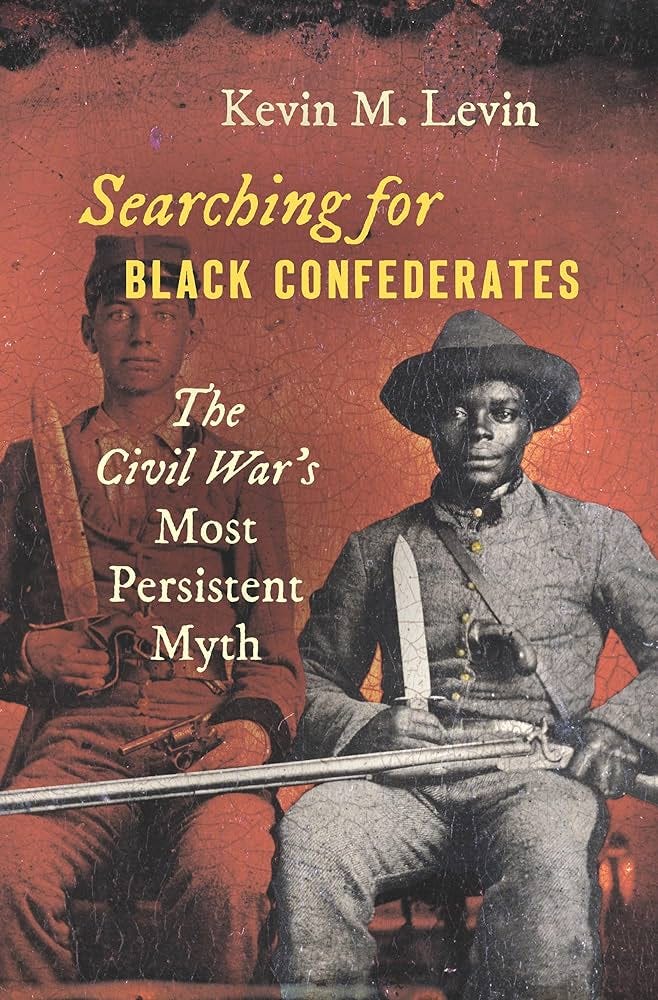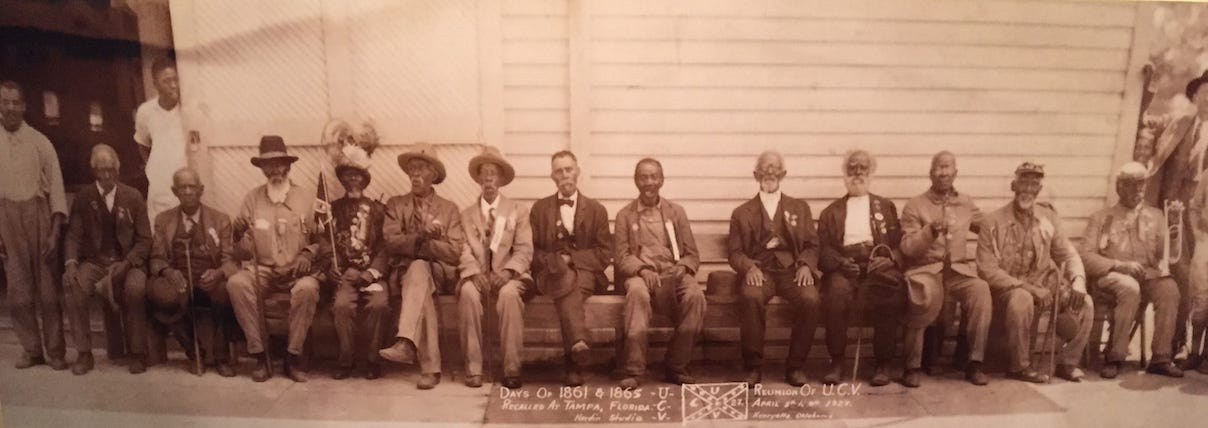Searching for Black Confederates Five Years Later
It's been five years since the book's publications, but there is still additional research that needs to be done.
Five years ago this week my book Searching for Black Confederates: The Civil War’s Most Persistent Myth was published by The University of North Carolina Press. My interest in the subject can be traced all the way back to 2008, when I first started writing about it on my blog. At the time the subject intersected with my deep and growing interest in the history of slavery and Civil War memory.
The book was reviewed positively in just about every academic journal, including Civil War History, The Journal of the Civil War Era, and The Journal of Southern History. I’ve seen the book referenced in a number of scholarly studies and have even seen references to “camp slaves”—a term I coined for the book instead of the more common “body servants”—to more clearly reflect the legal and cultural outlines of the master-slave relationship.
Overall, the book has been well received beyond academia. I’ve been gratified by the strong sales over five years and especially the many positive emails and messages received.
I wrote this book for the serious student of the Civil War interested in how the Confederacy mobilized enslaved labor, the experience of camp slaves, how they were remembered during the postwar years, and how their memory was eventually transformed into the myth of the Black Confederate soldier. Overall, I stand by my conclusions.
That said, I think there are some areas within the book’s broader focus that deserve additional attention from researchers.
I would love to see a comprehensive study of the role of free Blacks in the Confederate army. I am often criticized for not saying more about this particular group. My research questions were focused narrowly on the role of the enslaved and the book is structured around their experiences and how their role was remembered and eventually mythologized, but I agree that the role of free Blacks is important. You can find a bit about them in James Brewer’s book The Confederate Negro and Ervin Jordan’s book Black Confederates and Afro-Yankees in Civil War Virginia.
I don’t have a sense of their numbers or, more importantly, what their experiences looked like beyond the few jobs that they were allowed to take on during the war.
This is a subject that has particular interest for me as I am in the process of outlining a short book on the role of enslaved and free Black labor in the Army of Northern Virginia during the Gettysburg Campaign.
Case studies of Black men in Confederate ranks could offer some interesting insights. Consider Levi Miller, who I briefly touched on in the book and in this blog post. Can we piece together more of Miller’s wartime experience down? It looks to be an interesting example of the master-slave relationship at war that may give us a better sense of race relations in the ranks.
I assume there were others like Miller in the ranks, but the details that can be pieced together right now don’t undercut the fact that the Confederate government was crystal clear about who could enlist in the army. The debate over the enlistment of slaves as soldiers in 1864-65 is a clear reminder that Confederates understood that arming slaves would constitute a sharp departure from previous policies and their understanding of the “cornerstone” of their government.
We should take seriously real Confederates to explain who was and who was not a soldier in the Confederate army rather than our own presentist assumptions.
One of the subjects that I particularly enjoyed researching was the presence of former camp slaves at Confederate veterans reunions. I was able to focus on a few key figures, including Steve “Eberhart” Perry and Jefferson Shields, who offer insight into both why these men were so eagerly embraced by veterans and the large white audiences that attended these reunions as well as why they may have chose to attend.
While I am still very comfortable with my overall interpretation on this particular subject, I would like to see someone take on an even more focused study. Here’s an idea. Consider this photograph taken during the Tampa reunion in 1927.
There are fourteen men, all likely former camp slaves, in this photograph. In fact, the man seated sixth from left is wearing a white ribbon that says, “Former Slave.” Seated fourth from the left is Steve Perry and the man at the right with the bugle is Louis Napoleon Nelson. This photograph gives you a sense of the numbers of former slaves that attended Confederate veterans reunions.
This may have been the total number present at Tampa given the late date, but I suspect there were many more who attended earlier reunions.
I would love to see a more comprehensive study of this particular reunion that begins with identifying all of these men. Such a study could piece together their lives, especially during the postwar years, why they attended these reunions, how many, and how they interacted with the veterans and the white audiences that gathered for these events. It could tell us quite a bit about Lost Cause culture in the early twentieth century.
An even more amitious researcher could track the story of former camp slaves throughout the late nineteenth and early twentieth centuries at these reunions and other commemorative events.
These are just a few ideas.
Finally, a word for my friendly and enthusiastic detractors. What I find frustrating five years later is the continued attempt to undercut my findings with what I call “gotcha history.” This entials posting a newspaper clipping, photograph, muster sheet or some other primary source on a message board or social media without any attempt at interpretation or historical context.
The assumption seems to be that the document alone speaks for itself rather than taking the time to critque the source and placing it within a larger body of evidence and the rich body of scholarship on the Confederacy and slavery.
This is not how serious historians do history. Researching and thinking through evidence takes time. I spent a decade thinking about this subject and I know that I didn’t get everything right.
You want to add your voice to this subject? Write up your findings in an essay for publication. Looking for feedback? I would be happy to help if I have the time.
Thanks to all of you who have read and enjoyed the book.







This is my favorite book by you and you signed it for me one time, thank you!!!
Excellent book, and I'm glad to have it in hard cover. Very enlightening to read it along with Levine's Confederate Emancipation.